On the Tour de France trail (2)
12 July, 2018
Last week I shared with you two tips for combining your camping holiday in France with catching the Tour de France. The cyclists have by now started off on the three-week race, and it’s now time for the final three tips. Where’s the best place to park your motorhome or pitch your tent for following the Tour de France in week two and three?
In part 1 I told you where you had to be for the first part of the Tour de France. The cyclists are now riding northwards from the Atlantic coast to the Belgian border. After nine stages they’re boarding a plane to Annecy, where they can relax for a day. This will be vital, as the next day sees the start of a series of arduous Alpine stages. After this, following another day off on 23 July, the dreaded Pyrenees are also looming, concluding with an individual time trial and the traditional sprint stage to Paris.
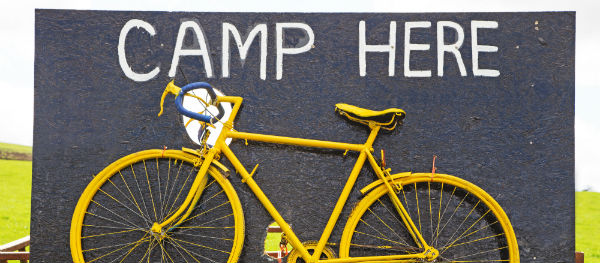
Tip 3: Camping among the mythical Alpine passes
Tuesday 17 July, Wednesday 18 July and Thursday 19 July
Genuine cycling enthusiasts know the famous Alpine passes by name, and this year there are once again a few classic ascents along the route. Among other things, the cyclists face the Col de la Croix Fry, the brutally steep Plateau de Glières, the Col de la Colombière, the Col de la Madeleine and the Alpe d’Huez. The Alpine trilogy commences on Tuesday 17 July with a ride from Annecy to Le Grand-Bornand. A day later, the race is going from Albertville to ski resort La Rosière, and Thursday 19 July sees the conclusion at the summit of the mythical Alpe d’Huez.
Excitement is guaranteed, and to take part in the final victory, the classification riders mustn’t drop back in these stages. That means your favourites are under enormous pressure, which draws plenty of cycling fans to the French Alps every year. It can get extremely busy, certainly on the infamous climbs, and absolutely at the finish. That means that to be sure of your spot along the route, you have to claim your place in good time. You’ll have to be there on time anyway, since the route of the stage is often closed of hours in advance. This means you’ll often have to go up the mountain on foot (or by bike) to lay claim your spot.
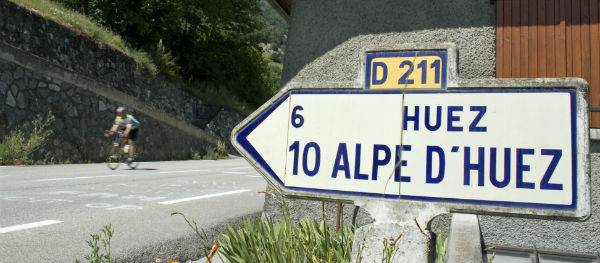
Fortunately, having to cycle or walk around here is an absolute pleasure. The region of the Alps, the Rhône-Alpes, is the ultimate place for an active holiday. The high mountain summits, refreshing Alpine lakes and vast pine forests are an amazing place bringing together nearly every outdoor activity you can think of. From trekking to horse riding, from water sports to golf, and from fishing to cycling; here, everything is possible. This is likewise a unique place for fans of more extreme sports such as rafting, mountain climbing and paragliding.
There is, of course, also the chance of fitting in a spot of relaxation. After all that exertion you’ll need a rest, and you’ll fully unwind on the shores of the Lake Geneva or Lake Annecy, for instance. However, here you can relax not only in the countryside, but it’s also nice to visit the terraces and restaurants in cities such as Geneva and Lyon. You’ll have every modern convenience at your disposal. Remember to visit the historic medieval centre of Tour de France stop-off Annecy.
Tip 4: Enjoying life in the South of France sun
Sunday 22 July, Monday 23 July and Tuesday 24 July
Live like a god in France. You’d almost think the saying must have come about in this region, the Languedoc-Roussillon. The question is whether the Tour de France cyclists think the same after 15 stages. They just left the Alpine stages behind them, and on Sunday 22 July they’re arriving in the streets of picturesque Carcassonne. There they can enjoy a day off on Monday 23 July, although a day later there’s yet another torturous Pyrenees race toward Bagnères-de-Luchon on the schedule.
Is a day-off in the Tour de France something worth seeing at close hand? It certainly is, not least because the race is in a decisive phase, and the media circus surrounding the well-classified cyclists will be in full swing. Marvel at the camera teams and journalists gathering around the cyclists’ hotels; and who knows, you might even catch a glimpse of your Tour favourite. Keep a close eye on the surrounding roads, since even on a rest day cyclists often also pop out for a training ride in the vicinity.
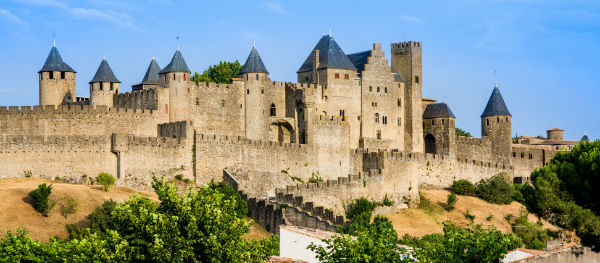
On Tuesday 24 July, the cyclists are once again gathering at the starting point in Carcassonne, in readiness for a few days of climbing the Pyrenees. While the peloton will have a hard time of it under the scorching sun, as a holidaymaker this of course won’t be such a nuisance. Languedoc-Roussillon has everything you’d want for the ideal holiday in the sun. The coastal region stretching 200 km, from Perpignan right up to student-city Montpellier, is dotted with small and large ports. Enjoy the sandy beaches in Béziers or Agde, immerse yourself in the French-Catalan atmosphere in Perpignan, or savour the culinary delights in one of the other places along the coast, or venture inland.
There you’ll find one of the region’s major attractions, and that’s the start and finish spot, Carcassonne itself. This is because the walled city, enclosed on both sides by the River Aude, boasts a unique and historic city centre, La Cité de Carcassonne. It is one of the most well-preserved medieval city centres in Europe, which since 1997 has been on the UNESCO World Heritage List. Walk through the Porte narbonnaise and follow the Rue Cros-Mayrevieuille to the impressive basilica of Saint-Nazaire. Here you can really soak up the medieval atmosphere, especially if you arrive slightly earlier in the day when it’s less busy.
Tip 5: The finale on the Spanish border
Thursday 26 July, Friday 27 July and Saturday 28 July
The Tour de France once again has a sting in the tail, with the finale this time taking place in the Spanish border area. In the region Aquitaine, in the extreme south-west of the department Pyrénées-Atlantiques, the cyclists once more have to traverse a number of notorious Pyrenees passes such as the Col du Tourmalet and the Col d’Aubisque. A day later, the general classification is drawn up after a 31 km individual time trial, from Saint-Pée-sur-Nivelle to Espelette. Can time-trial wizards Tom Dumoulin or Chris Froome seize their final victory here, or will ‘mountain goats’ such as Nairo Quintana and Romain Bardet remain out of their grasp?
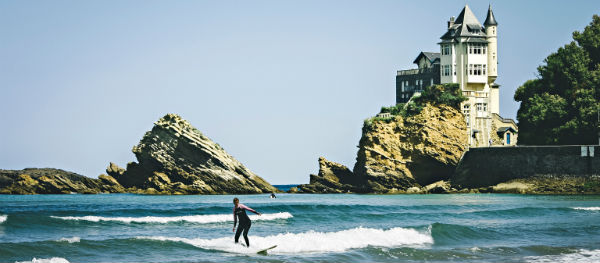
While it will undoubtedly be busy during the days the peloton is making its way through the region, this might normally be the least known area of Aquitaine. However, that could well change following all of the attention surrounding the Tour de France, given the impressive array of things to enjoy in the Pyrénées-Atlantiques. This region on the Atlantic Ocean, also known as the French Basque Country, is renowned for its impressive coastline with yellow, sandy beaches, green hill landscapes with vineyards and castles, and culinary specialists such as truffles and oysters.
Aside from the spectacle of the Tour de France, there’s also a great deal more to gaze at during your holiday. For instance, you could set out up the coast where you’ll find lively beach resorts such as Bayonne and Biarritz. Bayonne has an animated city centre brimming with Basque influences, with a major jazz festival being organised here every July. Biarritz is known for its perfect location for surfers, and even boasts an entire museum dedicated to the ocean.
Inland from the French Basque country also has to be seen. The mountains and hills are in any case a wonderful location for bike rides and walks, yet they also contain a very special place, since going toward Sainte-Engrâc you encounter the imposing Kakuetta Gorge. A walk through this deep and otherworldly gorge take around three hours, and is certainly isn’t always easy. However, the wonderful countryside and the sheer number of breath-taking locations and photo opportunities mean it’s all worth it.
If you would like to know what time you can expect the cyclists at your spot along the route, the anticipated passing-time for each stage is stated on the official Tour de France website. To find this, go to the desired stage and click on ‘Time Schedule’.


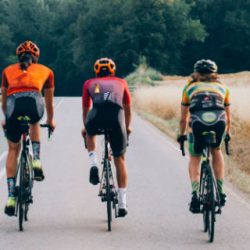
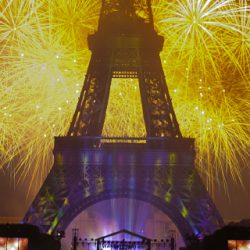
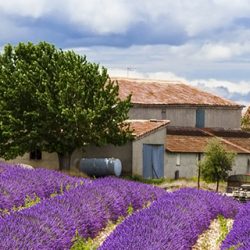
Latest comments